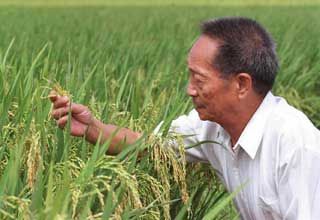China Face
Party profiles: Agriculturalist Yuan Longping
Updated: 2011-05-03 11:23
(chinadaily.com.cn)
Yuan Longping, a Chinese agriculturalist, was born in Qianyang, Hunan province in 1930. Professor Yuan graduated from Southwest Agriculture College in 1953 and has since devoted himself to agricultural education and research.
 Professor Yuan Longping checks hybrid rice in this file photo. [Xinhua] |
Professor Yuan was a pioneer in hybrid rice research and made remarkable achievements in this area, first developing hybrid rice in the world. The achievements of Yuan Longping greatly solved the food shortage, and provided as a solution the worldwide starvation. It is regarded as the fifth invention after China's Four Major Inventions, and is acclaimed as the Second Green Revolution.
He was awarded with many international awards, such as Gold Medal Award for the Outstanding Inventor of the United Nations World Intellectual Property Organization, Science Prize of United Nations Educational, Scientific and Cultural Organization, Rank Prize for Agronomy and Nutrition of the United Kingdom, Medal of Honor for Food Security and Sustainable Development of the United Nations Food and Agriculture Organization, and Fukui International Koshihikari Rice Prize of Japan.
| ||||
In 1964, he happened to find a natural hybrid rice plant that had obvious advantages over others. Greatly encouraged, he began to study the elements of this particular type.
In 1973, in cooperation with others, he was able to cultivate a type of hybrid rice species which had great advantages. It yielded 20 percent more per unit than that of common ones.
The next year their research made a breakthrough in seeding. They successfully developed a set of technologies for producing indica (long-grained non-glutinous) rice, putting China in the lead worldwide in rice production. For this achievement, he was dubbed the "Father of Hybrid Rice."
In 1979, their technique for hybrid rice was introduced into the United States, the first case of intellectual property rights transfer in the history of new China.
At present, as much as 50 percent of China's total rice fields grow Yuan Longping’s hybrid rice species, yield 60 percent of the rice production in China. Due to Yuan's hard work, China's total rice output rose from 5.69 billion tons in 1950 to 19.47 billion tons last year, about 300 billion kilograms more have been produced over the last twenty years. The annual yield is enough to feed 60 million people.
The "Super Rice" Yuan is now working on yields are 30 percent higher than those of common rice. A record yield of 17,055 kilograms per hectare was registered in Yongsheng County in Yunnan Province in 1999.
Specials

British Royal Wedding
Prince William and Kate Middleton married at Westminster Abbey in a royal occasion of dazzling pomp and pageantry.
Best wishes

The final frontier
Xinjiang is a mysterious land of extremes that never falls to fascinate.

Bridging the gap
Tsinghua University attracts a cohort of foreign students wanting to come to China.


